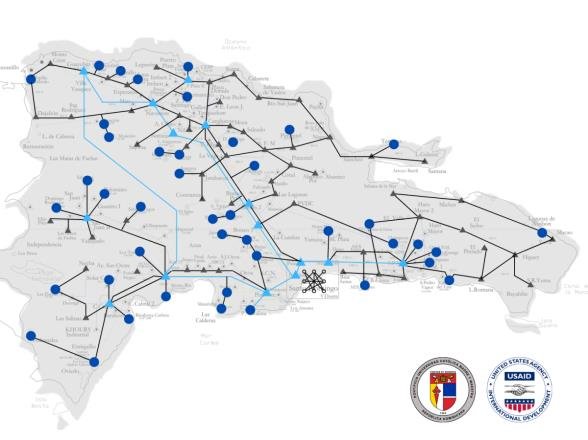|
Cycle 9 (2020 Deadline)
Resiliency analysis for the development of microgrid architecture against climate-driven events in the Dominican Republic's electric systems
PI: Ramón Emilio De Jesús Grullón (r.dejesus@ce.pucmm.edu.do), Pontificia Universidad Catolica Madre y Maestra, Dominican Republic
U.S. Partner: Hashem Nehrir, Montana State University
Project Dates: April 2021 - August 2023
Project Overview
Recent severe power outages caused by increasingly frequent climate-driven events have highlighted the urgent need to improve grid resilience worldwide. Traditionally, the power industry has focused on methods that aim to restore loads after a fault by altering the topological structure of the distribution network, effectively isolating the fault and restoring as much load as possible after the general blackout. However, when the distribution system is severely damaged, traditional approaches cannot guarantee that energy will be supplied to much needed critical loads. This is where microgrids (MGs) have emerged as a tool due to their potential to recover quickly and effectively, providing an alternative approach.
Active MG integration into the grid requires a robust modeling process and hardware testing, and this PEER project tackled both. Researchers used the latest real-time power hardware-in-the-Ioop (HIL) simulation platforms to model device integration and create a PHIL testbed, the first developed in the Dominican Republic. The testbed will serve not only as an educational tool to promote training and learning in this key technology area but also as a benchmark for government agencies, communities, and industry looking to integrate renewable energy sources and resilience into their decision making process and policies. It will also perform as a test platform for device-agnostic energy storage and electric vehicle integration into the energy grid.
Final Summary of Project Activities
The PEER team developed a working group with a regional utility company EDENORTE. Working with the company’s research team, Researchers developed a documentation on how to obtain, clean, and transform the utilities’ existing GIS data to be fed into the QGIS2OPENDSS Plugin, developed to automatically generate distribution network models for OpenDSS. This plugin was developed by researchers at the EPER Lab in the University of Costa Rica (UCR) to exponentially reduce modeling time to simulation time when assessing the evolution of distributed generation and power systems.
When they completed this work, the researchers shared a technical presentation of results, tools, and possibilities for more in-depth analysis to EDENORTE. They also undertook a series of trainings on the real-time simulator for the microgrid laboratory and new testbed, which was installed in mid-2022.
Throughout the project period, team members organized a variety of events, including a seminar on Smart Cities, a capacity building workshop on modeling and simulation of electrical distribution networks, and webinars on microgrids and the future of energy in the Dominican Republic. They also organized a symposium on the latest in microgrid research. Project members kept stakeholders and others updated through publishing a blog on their research efforts, and launched a GitHub repository with the Geographic Information System (GIS) and Distribution Network data, along with the OpenDSS network models created the project, serving as a platform to develop future work and research.
With the creation of the microgrid laboratory on campus, many electrical engineering courses now have access to new testing tools for practical and conceptual lessons.
As part of his PhD research, PEER project team member Rafael Batista conducted research on the use of biological-inspired optimization techniques in networked microgrids for resiliency, exploring Swarm Intelligence (SI) and the particle swarm optimization algorithm (PSO). The project team received several grants to continue their work, including a $345,000 grant from National Fund for Scientific and Technological Innovation and Development. In addition, early in the project period, PI Ramón Emilio De Jesús-Grullón served as the main external researcher and editor for the Dominican Republic’s “Indicative Plan for Critical Energy Infrastructure.”
Outreach with the USAID Mission in Santo Domingo has also been ongoing. The team presented the progress of the project to Mission staff and agreed to connect with related projects in the country, such as the Energy Sector Reform (ESR) project, Green Recovery Investment Platform (GRIP), the Fulbright program. The team hope this will help them establish further connections with more professionals, as well as discover further financing and capacity development opportunities.
Publications
De Jesús-Grullón, R., Batista, R., Espinal Serrata, A., Pichardo, J., Guerrero, N., & Bueno, J. (2023). Modeling and Simulation of Distribution Networks with High Renewable Penetration in Open-Source Software: Qgis and Opendss. https://doi.org/10.2139/ssrn.4523911
|
|
|
|





